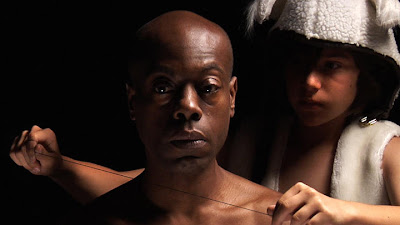
Oy, some experiments just go too far without ever realizing exactly what’s happened. While the initial idea of an AIDS opera is mildly appealing, this film mishandles the conceit to the nth degree, where ‘n’ is equal to the number of split-screens used in any given frame. Fig Trees‘ press notes and singers inform the viewer that the idea for the film is based on Gertrude Stein’s ‘Four Saints in Three Acts.’ Non-opera buffs will just have to trust that Greyson is being faithful to his sourc and ‘referencing’ is with justice, as I certainly know nothing about it, and suffered for it. Fig Trees doesn’t stop at being a documentary-opera combo, either, but also tries its hand at fairy tales, student-grade avant-garde, absurdism, kitsch, performance art, and political protest; AKA: The Greatest Film Ever Made.
The little boy in the image above isn’t going trick-or-treating after he makes the indented musical scale on that guy’s neck; he’s just one of the three incarnations of an albino squirrel that pops up every few minutes in the film – first as a stuffed toy squirrel, then as this opera-lip-syncing adolescent, and finally as an actual albino squirrel that was caught on camera in Toronto’s Queen West Park. The creature’s appearances (and there are many) are usually played for laughs, because every AIDS doc needs some comedy, as well as an artist’s sensibility: cue the split-screens and amputee keyboard player (yes, the one from Spadina and Dundas). Split-screens allow the viewer to see every singer at the same time, and, since everything that the singers are singing is subtitled in scrolling, sing-along text – since we’re supposed to actually learn about AIDS while hearing our opera – we get the pleasurable task of reading four or more different lines of lyrics at the exact same time, which forced me to ignore what the music sounds like altogether in my panic to try and get every perspective on just why Zackie Achmat stopped taking his medication (fortunately, someone’s been keeping up with CNN).
Palindromes are also omniscient in the script, allowing multiple opportunities for opera singers to sing sentences that are spelled the same forwards and backwards, appropriately accompanied by mirrored landscapes that are straight out of a post card. As I’m writing this, I’m realizing that Fig Trees might sound like it has awesome cult potential, or maybe even make a great drug movie. And it would, perhaps, if not for the fact that it is about AIDS, and tries to discuss it seriously, and remembers this for long stretches of time which would act as serious buzz-kills. In trying to do everything, a trait that a good chucnk of my audience fell over themselves for, it nixes potential audiences one by one, leaving only those extremely dedicated to liking it, or moderate opera fans (I can’t see a hardcore aficionado taking this seriously for a minute).
